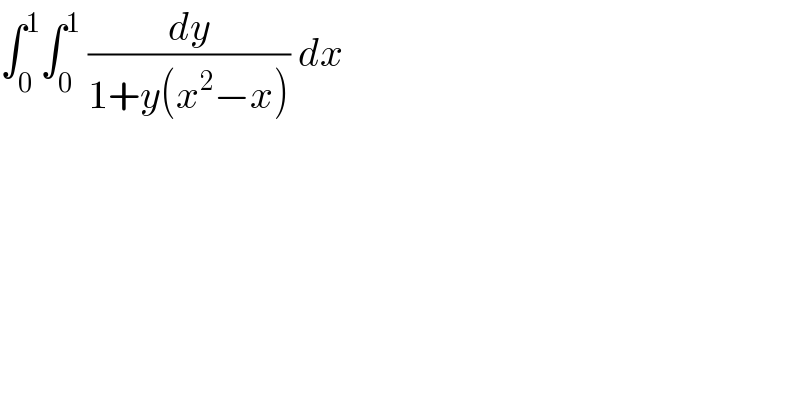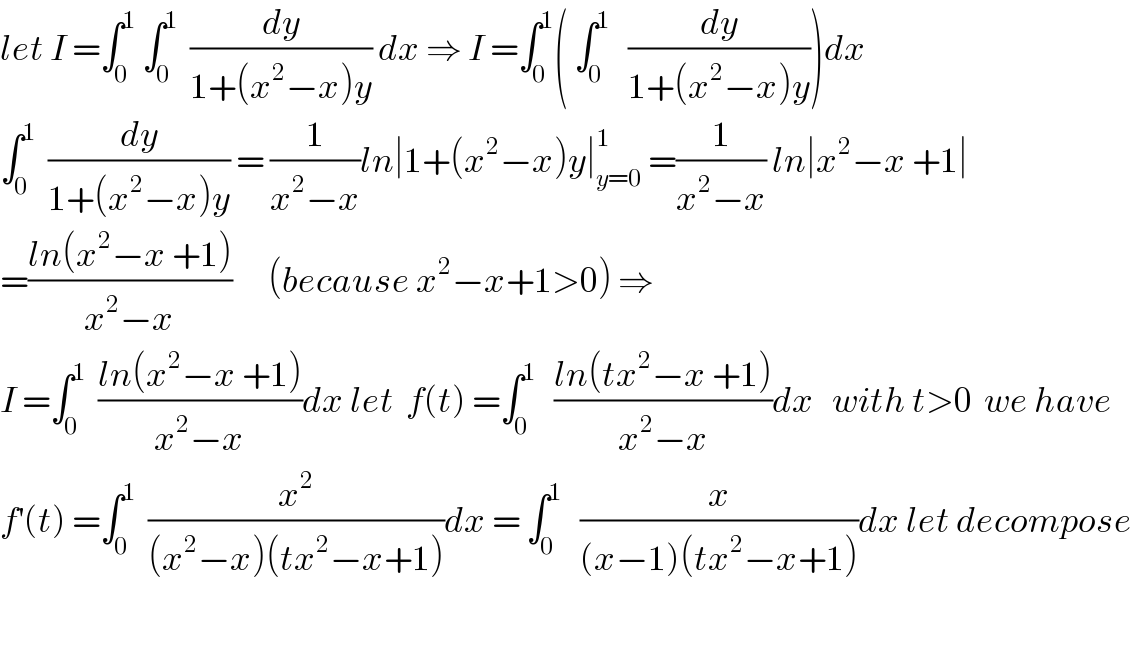
Question and Answers Forum
Question Number 63292 by aliesam last updated on 02/Jul/19

Commented by mathmax by abdo last updated on 02/Jul/19

Commented by aliesam last updated on 02/Jul/19

Commented by mathmax by abdo last updated on 02/Jul/19
![let decompose F(x)=(x/((x−1)(tx^2 −x +1))) F(x)=(a/(x−1)) +((bx +c)/(tx^2 −x+1)) a =lim_(x→1) (x−1)F(x) = (1/t) lim_(x→+∞) xF(x) =0 = a+(b/t) ⇒at +b =0 ⇒b =−at =−1 ⇒ F(x) = (1/(t(x−1))) +((−x +c)/(tx^2 −x +1)) F(2) =(2/(4t−1)) =(1/t) +((−2+c)/(4t−1)) ⇒2 =((4t−1)/t) −2 +c ⇒c=4−((4t−1)/t) =(1/t) ⇒ F(t) =(1/(t(x−1))) +((−x+(1/t))/(tx^2 −x+1)) =(1/(t(x−1))) +((−tx +1)/(t(tx^2 −x+1))) ⇒ f^′ (t) =∫_0 ^1 (1/(t(x−1)))dx −(1/t) ∫_0 ^1 ((tx−1)/(tx^2 −x+1))dx =(1/t){∫_0 ^1 (dx/(x−1)) −(1/2)∫_0 ^1 ((2tx−1−1)/(tx^2 −x+1))dx} =(1/t) { [ln∣x−1∣ −(1/2)ln(tx^2 −x+1)]_(x=0) ^1 +(1/2) ∫_0 ^1 (dx/(tx^2 −x+1))} =(1/t){[ ln(((∣x−1∣)/(√(tx^2 −x+1))))]_(x=0) ^1 +(1/2) ∫_0 ^1 (dx/(tx^2 −x+1))}....perhaps the integral diverges... ...be continued....](Q63348.png)
Commented by mathmax by abdo last updated on 02/Jul/19
![let change the ordre of integral I =∫_0 ^1 (∫_0 ^1 (dx/(1+yx^2 −yx)))dy we have A(y)=∫_0 ^1 (dx/(yx^2 −yx +1)) →let solve yx^2 −yx +1 =0 Δ =y^2 −4y <0 due to 0≤y≤1 ⇒yx^2 −yx +1=y(x^2 −x +(1/y)) =y( x^2 −2x(1/2) +(1/4) +(1/y) −(1/4)) =y{ (x−(1/2))^2 +((4−y)/y)} ( y≠0) we use the changement x−(1/2) =(√((4−y)/y))t ⇒t =((2x−1)/2) (√(y/(4−y))) A(y) = ∫_(−(1/2)(√(y/(4−y)))) ^((1/2)(√(y/(4−y)))) (1/(y ((4−y)/y)(1+t^2 ))) (√((4−y)/y))dt =(1/(√(y(4−y)))) [arctan(t)]_(−(1/2)(√(y/(4−y)))) ^((1/2)(√(y/(4−y)))) =((2arctan((1/2)(√(y/(4−y)))))/(√(y(4−y)))) ⇒ I =2 ∫_0 ^1 ((arctan((1/2)(√(y/(4−y)))))/(√(y(4−y)))) dy ....be continued....](Q63350.png)
